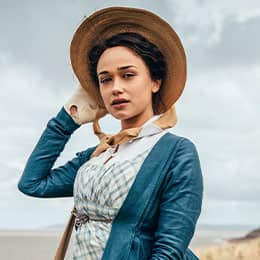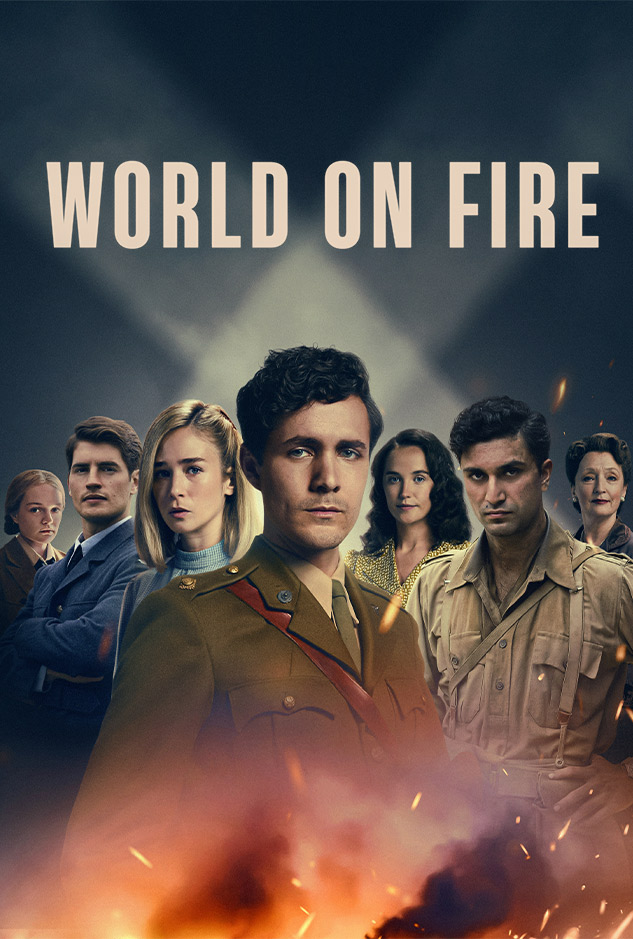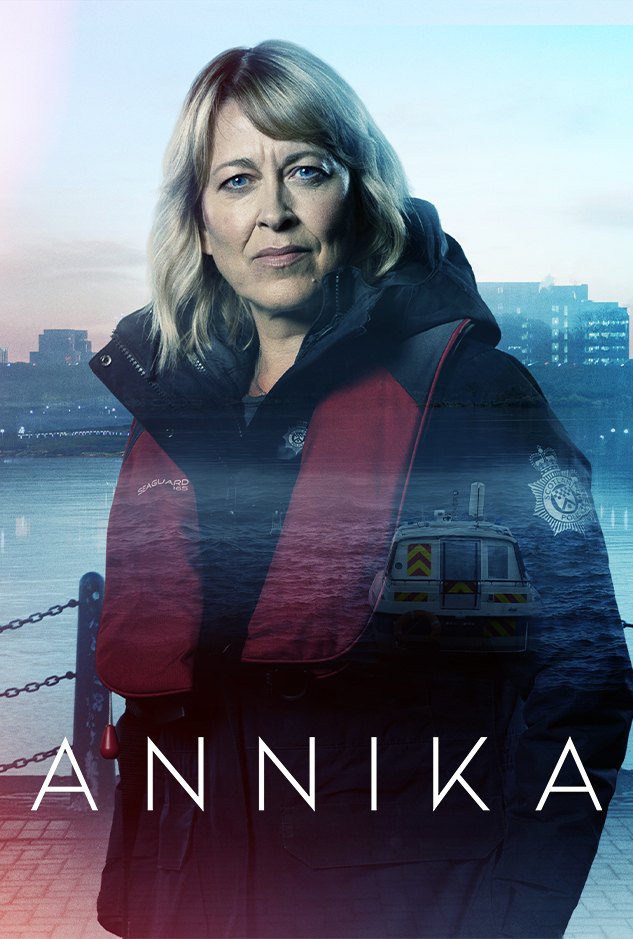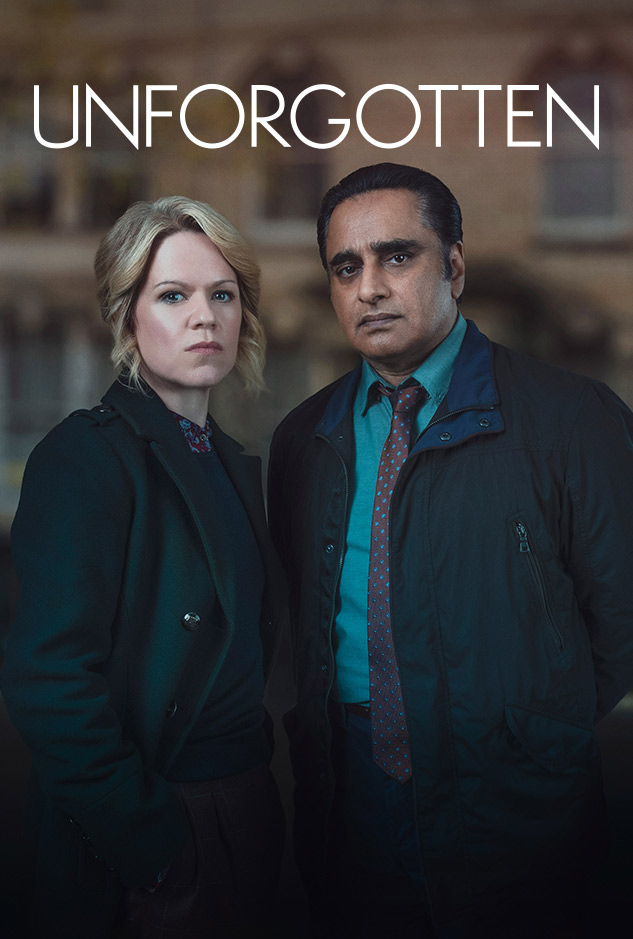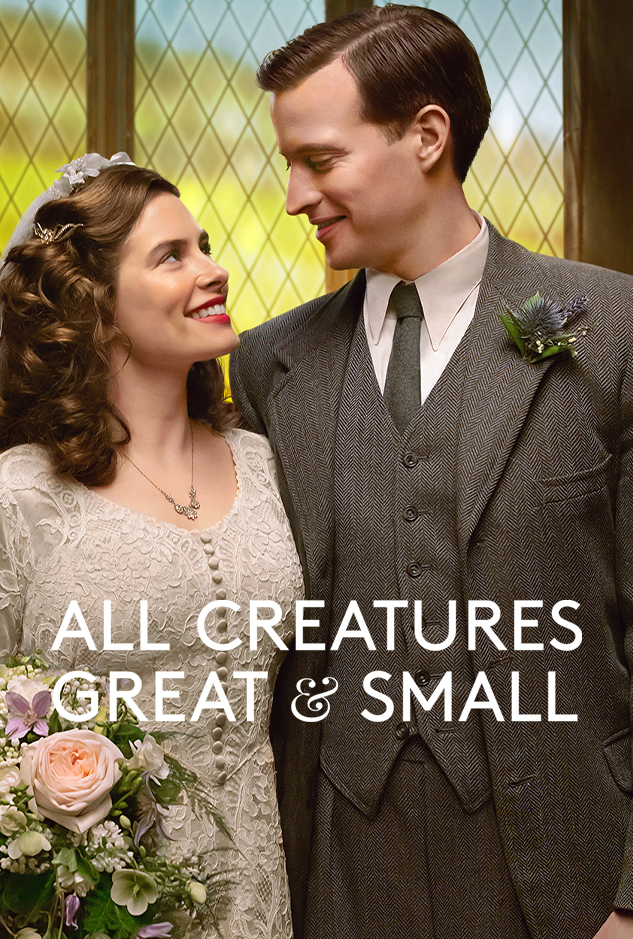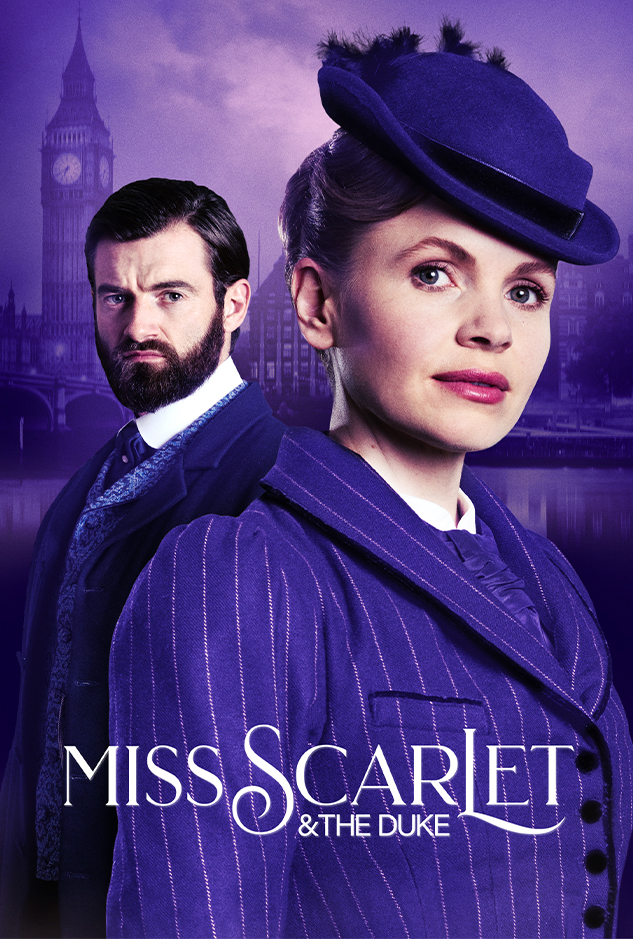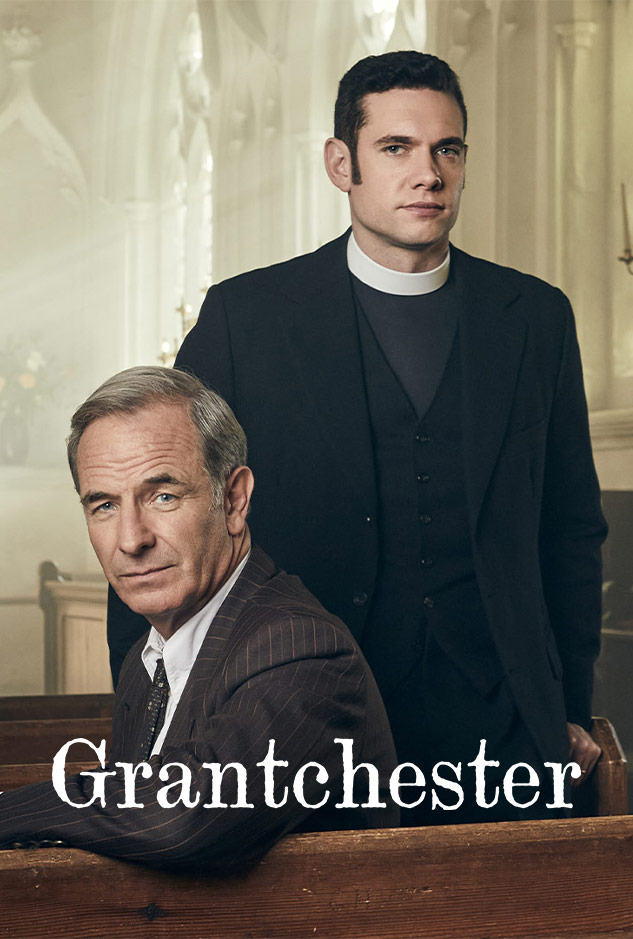Interview: Ben Lloyd-Hughes on Sanditon’s Final Season
Ben Lloyd-Hughes, the leading man behind Sanditon‘s Alexander Colbourne, takes us behind the scenes of the final season of the Jane Austen inspired show as seen on MASTERPIECE. From “Ain’t No Mountain High Enough” to Christmas carols, from Happy Ever After to the joys of filming, discover how Lloyd-Hughes brought some of your favorite moments to life and sincerely loved the work that it took.
Contains significant Series Finale spoilers.
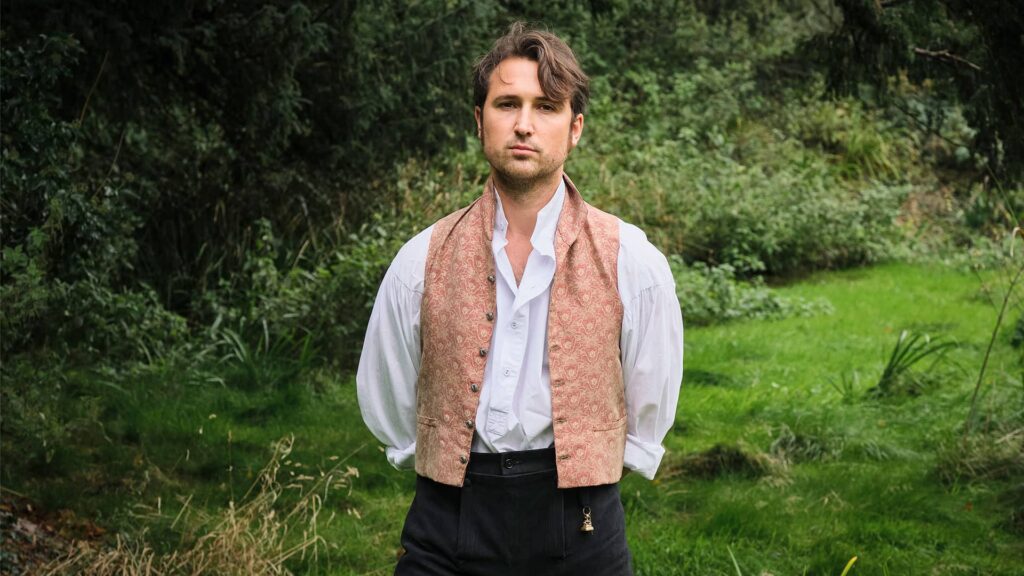

Can you share your experiences about making the series finale, especially that incredible scene with Colbourne and Charlotte on the clifftop, where he declares, “You bewitched me…”?
I remember filming it. It was so windy and so cold, and Rose and I were just almost getting blown off the cliff, it was that strong. And I remember in between takes having to hide in Land Rovers just to protect the wigs and costumes and everything from the wind, and just to hear yourself think. I was convinced that we would have to either reshoot it or ADR [re-record the audio in a sound studio] it, and amazingly we didn’t have to. There was even a bit of talk from some producers about maybe we should reshoot because it was just so windy. But Rose and I loved it. It really helped us with the drama and the epic nature of it, and I loved the idea that you have to shout—that you couldn’t be small and intimate, but you have to almost shout over the wind. And I’d been riding for ages to find her and to catch her before she left.
Both that scene and the final scene on the promenade were really poignant scenes to film. And for me, I’d done two series back to back and it was amazingly satisfying—I’d never played a character who got the girl, essentially. And so it was after all the 12 episodes. It’s rare that you get a chance to do that kind of story arc, knowing that it’s finishing. So often you think, “Oh, maybe we’ll come back and finish this story,” and then it doesn’t get picked up, so I found it very poignant.
But for Rose—and you may forget how many years and months it’s been since she first auditioned for the first series of Sanditon, probably—for her to have gone on that journey of the highs and lows, and the show getting canceled and being brought back, and everything that she imagined and wanted from Seasons 2 and 3, I think I underestimated what it meant to her. I knew that she was passionate about it, but when we were filming those scenes, I found them very poignant, but I think as an actor I wanted to treat them like any other scene, which is to give every scene its own respect and duty, but if you, as an actor, linger on it too much, if you are too aware of the momentous nature of it, then you are not present in the scene. You’re viewing yourself and your finished product. Your acting might not be as electric because you’re already thinking about the potential meme quality of it, so to speak.
But Rose was amazing in the finale, especially on the promenade, in saying that she really wanted to make sure that the way that we were walking down the promenade, every word that she was saying, every look—that the story we were telling was just right, because, she said to me, “I’ve been thinking about this for the last three (or however many) years.” And I guess I naively didn’t quite understand what it meant, that this is so Charlotte’s story, and so it’s such a closure for Miss Heywood, that of course it’s vitally important that what those words mean, “I think a girl can be whatever she chooses to be.” The exact wording of that, and how that sentence came about, she was really passionate about getting it right, and what the options were. Sometimes I think I’m less worried about the words—as long as I feel like they’re of a good standard, it’s about making any words make sense and tell a story. But I realized at that point that she was right, and that it would be remiss of her to, on the final hurdle, not give it its full due.
What do you imagine was going on for Colbourne during those powerful scenes?
In those two scenes on the cliff and the promenade, I think it was a huge sense of relief for him. He’s a man who, when we first met him, was clouded with grief and torturous memories. So I do believe that cliff scene is closure for him, but it’s also that feeling of lightness, of a weight being lifted off your shoulders and being able to breathe. It’s like he hasn’t been properly breathing for the two series, and it’s only at that very end that he could breathe. That was the characterization for him in a way—he could be so contained and so insular and such an introvert, that I tried at least to convey this sense of almost a different physicality of someone who could finally look up, and not look down, and breathe again, and hold his head high.
When he makes that declaration on the clifftop, it’s a very different moment for them, because they’re finally in the same place. It’s different from having to declare his love and hope that it’s reciprocated. He knows that it’s reciprocated, right?
I think so. Obviously, we never see what Leo says to him, do we? But certainly, in the writing and the storytelling, you get the sense that he knows that the stars are finally aligned as far as he was concerned. And I’ve certainly been in those moments—not necessarily getting married to someone, but that sense of sheer elation and joy of a scenario that you could only have imagined in your wildest dreams, where that comes true, it feels like you’re walking on clouds because you’ve dreamt of this moment for so long, or hypothesized about it in your dreams, and then it just feels like you are daydreaming, I suppose. And I think it’s that sense of relief.
I remember, we had an intimacy director on set about the kiss and how we were going to do the kiss, and [convey] that sense of relief and exhaustion, that it’s taken so many months and ups and downs to get to this point and that feeling of, “Well, this is a kiss, but this doesn’t have to be the defining kiss of our lives, because we’re about to spend the rest of our lives together.” So in a way, it’s more of a hug—it’s an exhausted falling into each other’s arms because we now don’t have to…All the previous kisses you see from us before were stolen, illicit kisses, either illicit for obvious relationship reasons, or illicit because of society. And now it’s not a stolen kiss—it’s a kiss of relief and happiness and almost the sense that we’re about to spend the rest of our lives kissing, so we don’t need to put too much pressure on this one.
We understand that you’re one to break into song on set, so are there any songs that you sang on repeat?
Yes. What did I used to sing? Certainly “Matchmaker, Matchmaker” from Fiddler on the Roof. And “Ain’t No Mountain High Enough” by Marvin Gaye. Sometimes I think I sing because I’m processing something as a character and an actor that I can’t express. And it’s probably the subconscious. So, “Ain’t No Mountain High Enough” is certainly a perfect metaphor for Charlotte Heywood and Alexander Colbourne. And “Matchmaker, Matchmaker,” certainly there was a lot of that in Sanditon and just the love rivals, always circulating, feeling like you’re in competition with someone, and obviously what was going on with Augusta and stuff. I can’t remember any more specific songs you’d probably have to ask. I’m sure Rose would remember instantly. But certainly, it was my decision, or my role in on set to try and keep it as loose and relaxed as possible, and singing can sometimes lighten the mood a bit.
Of all of Colbourne’s scenes over Seasons 2 and 3, do you have a favorite moment?
Do you know what? There is, and I think it might have been cut. At the beginning, halfway through Episode 1, there was a scene of Colbourne walking through his land, to his lake, and he’s just found out that Miss Heywood is back, and expressed regret. And he’s got this real hope. It was basically a cool costume that was a really nice waistcoat, and the costume designer had decided to give me a fully go Colin Firth in Pride and Prejudice white shirt and bare arms. It was quite dramatic weather, rainbow weather of sunny but then showers, and I was walking and the camera was following me, and I was looking at the house, and at my future. I really enjoyed it and it felt like a real moment for Colbourne, That was a favorite moment, but it may never exist.
Do you have a favorite time or experience from the making of Sanditon, when the cameras weren’t rolling?
There’s a few. One was a really fun time, it was when we were filming on a Saturday, which always feels a bit giddy, and it was very near Christmas and we were filming in the church where Lady Denham is meant to be getting married. And some of us—I remember it was me and Turlough [Arthur Parker] and Ed Davis [Lord Montrose] and Alice Orr-Ewing [Lydia Montrose] and Emma Fielding [Lady Montrose]—we started spontaneously singing Christmas carols and harmonizing. And because we’re in this church with these acoustics, and these period costumes, it just became this impromptu Christmas carol service. It was just an amazing moment of ensemble collaboration, of harmonizing and fun, and the crew just kind of stopped what they were doing and applauded. It really made me laugh; I had a big smile on my face. It just felt very Christmassy and magic.
Apart from that, I remember going to see the new Bond film with Ed Davis and one of the directors and the cinematographer. That was a fun off-set moment, because I think sometimes when you watch another piece of work, that makes you appreciate what you are doing a bit.
And then another moment was when we were doing the final wedding scene, where you go around the room and everyone’s there for the reception drinks. It was rare that you get almost all the characters together at once, and so that was such a rarity. In the green room when we were waiting, we played dinner party games, essentially, the sort where you had to name films with code words, the equivalent being you’d have to give a clue to two films…But it was just a fun time of everyone being there, which was such a rarity and having a laugh.
Is there anything of Colbourne’s character that you’ve taken with you?
I think his ability to forgive, in the end. It took him a long time, but to forgive other people and to forgive himself is something that I have tried to learn, and still haven’t quite, necessarily, in all aspects of my life. But I found it very moving, his journey. And I saw a lot of similarities—maybe that we always do when we’re playing a character—but I saw a lot of myself in him. I certainly am not the second son of an inherited estate, but I am a second son, and so I saw a lot of myself in him, and his relationships with people, and certainly as a parent and a father. And I think he’s real man of integrity, so if I could have half as much integrity as him, I’d be onto a winner.
What have you found yourself missing the most from your Sanditon experience?
There’s a lot of things. I miss the character. I loved Colbourne. It was such a gift, and it’s not every day you get to play a part like that. I’d certainly put it out in the universe and dreamt of playing that kind of role, and had even said to my agent a few months before, “If they ever do Pride and Prejudice again, I’d just love to be considered for Mr. Darcy,” and they laughed at me, and I don’t blame them for laughing. Because they were just like, “Okay, well that’s never going to happen.” And so it was quite funny what then came about.
I haven’t necessarily had a career where I’ve been the character that’s on set every day, waking up in the morning with a lot of the scenes revolve around him. And so that was a gift in itself, to play that kind of lead, and to wear those costumes, to work with those actors, and to be the guy who gets the girl, to have romantic scenes—it’s something that I haven’t experienced too much of, and I really enjoyed it, the dancing, and the looks, and the subtext, and the anguish. It was just a joy.








